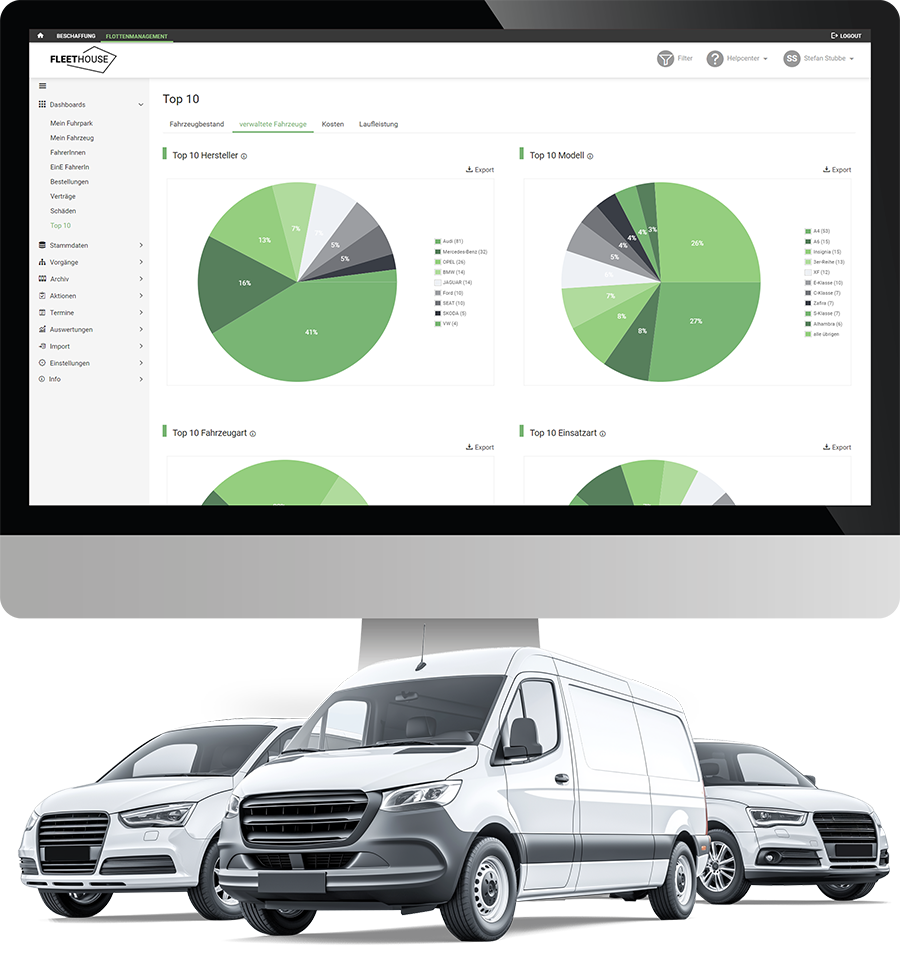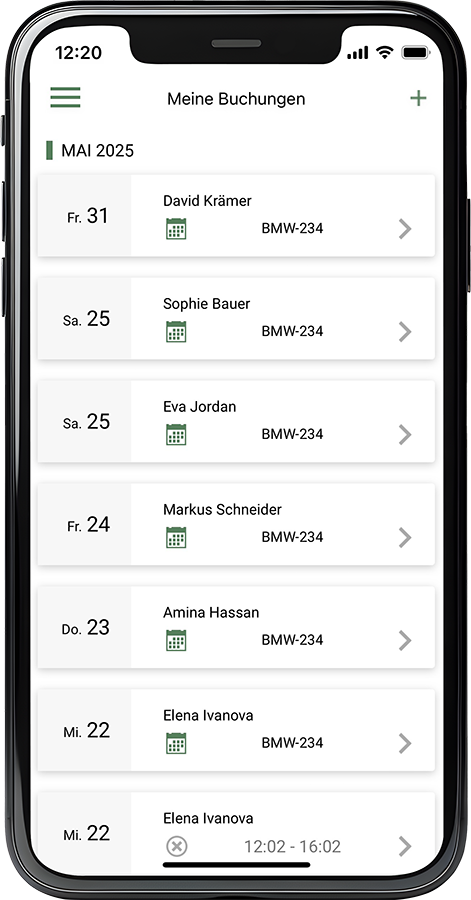Well-organized fleet management plays a central role for any company with vehicles in its fleet. It ensures the smooth organization of company cars and helps to comply with legal requirements. In the following, we will introduce you to the basic areas of fleet management and show you how a software solution can provide valuable support.
Contents
What does fleet management mean?
- optimize the operation of the vehicles
- Plan maintenance intervals and repairs in good time to minimize downtimes and extend the service life of the vehicles
- Control and reduce costs
- ensure the safety of drivers
- Comply with legal requirements and regulations to reduce the risk of fines and legal issues
The terms fleet administration and fleet management are often used interchangeably. However, there are subtle differences. In fleet management, the focus is on operational and administrative aspects of the fleet, such as monitoring vehicle usage and maintaining vehicle data.
Fleet management, on the other hand, has a more strategic and long-term approach. This includes data analysis and the development of processes to increase efficiency.

Digital fleet management
With Fleethouse, you can test digital fleet management free of charge, as you can use all the software functions for 30 days without obligation.
What tasks are included in fleet management?
The tasks associated with fleet management are very varied and extensive. The most important activities of a fleet manager include
- Vehicle procurement: selection and acquisition of suitable vehicles in accordance with the company’s own budget and requirements
- Maintenance and repairs: All vehicles must be regularly serviced and checked for roadworthiness and operational safety
- Cost control: monitoring and optimization of costs associated with the procurement, operation and maintenance of the fleet
- Fuel management: monitoring and optimization of fuel consumption to reduce costs and minimize CO2 emissions
- Compliance with regulations: Vehicles and operating procedures must comply with relevant laws and safety standards; this includes compliance with keeper liability obligations
- Claims management: handling claims and ensuring that employees remain mobile
- Insurance management: management of insurance policies for the vehicle fleet

Is fleet management with Excel still up to date?
Many companies use Excel spreadsheets to organize their vehicle fleet. Excel can be used to create and maintain vehicle lists, schedules and cost overviews. One advantage here is that many employees are familiar with the application and it is easy and inexpensive to use.
Despite this, Excel often reaches its limits when it comes to complex analyses and automation. In addition, data maintenance is often very time-consuming and error-prone.
Fleet management with the help of software
Where Excel reaches its limits, fleet management software such as Fleethouse can be the solution. Such software significantly minimizes the effort required for administrative tasks, reminds you of deadlines and facilitates data evaluation. It helps to identify cost outliers and long-term trends, thereby reducing fleet costs.
All data, including the associated documents, can be stored centrally and clearly so that they can be found quickly. Ideally, fleet software should have a modular structure so that you can add or remove the desired functions as required .
In our free guide, we give you tips on how a software solution can make your day-to-day fleet work easier: Getting started with digital fleet management
Controlling in fleet management: increasing efficiency and optimizing costs
Webinar: Checklist for fleet management
In our free webinar, you will receive valuable tips on what to look out for when managing a vehicle fleet – from owner liability to the right form of financing.
Contracts and agreements in fleet management
Fleet management also includes the Establish clear rules and agreements to ensure reliable operation and legal security. This primarily concerns the use of vehicles, the responsibilities of drivers and insurance issues. As part of a Car Policy, you define detailed guidelines for the selection and use of vehicles and the reporting of damage. You should always record contracts with drivers in writing to prevent conflicts later on.
Important contracts with external parties include purchase and leasing contracts, insurance policies, fuel cards or contracts with service partners or suppliers for tires and accessories. You should monitor these contracts carefully so that the invoices are correct and mileages are not exceeded.
Management of pool vehicles: car sharing in the fleet
The use of pool vehicles can reduce costs in the fleet, because instead of assigning a vehicle to each driver, the company vehicles are shared. However, if pool vehicles are part of the fleet management, there are some special features to consider.
With corporate car sharing , it is important to keep track of vehicle availability in order to avoid double bookings and ensure that the fleet is optimally utilized. This helps you avoid bottlenecks or long delays. This can be significantly simplified by using car sharing software. The software facilitates the booking of journeys and takes over the scheduling of the vehicles. Drivers are automatically notified by e-mail in the event of rebookings or delays.

The complete package for car sharing in the fleet
From booking to owner liability to return – Fleethouse offers all functions for smooth car sharing.
Digital fleet management for greater efficiency
FAQ - Fleet management
Well-organized fleet management ensures that vehicles are used optimally, maintenance is carried out on time and operating costs are optimized. It also ensures that legal requirements such as driver training and driving license checks are adhered to.
In addition to digitalization, the switch to electric vehicles is also playing an ever greater role in the fleet, as companies are increasingly setting themselves sustainability targets. Automated processes, such as digital driver’s license checks or driver instruction via e-learning, are also becoming increasingly popular and help to save time and reduce costs.
Fleet software simplifies the automated recording and management of all data and documents such as mileage, fuel data and leasing contracts. This significantly reduces the administrative workload in the fleet. It is also easy to keep track of the large number of appointments. Software also provides targeted evaluations of costs, consumption and CO2 emissions.
Arrange an online consultation appointment
Arrange your personal consultation appointment now. You can easily select a suitable appointment using our booking tool.
The most important facts about fleet management
Efficient fleet management plays a significant role for companies, regardless of the number of vehicles.
It not only contributes to driver safety, but also ensures that the fleet is operated economically and sustainably.
The use of a software solution can save a lot of time and effort in fleet management.
More articles on the subject of fleet management
Digital fleet management: Why even small fleets should digitize their fleets
Fleet at a Glance: Importance, Trends and Technologies
Fleet Manager: Tasks, Qualifications and Salary
Owner liability in the fleet: what fleet managers should bear in mind
Corporate car sharing: advantages and tips for introducing it in your company
Corporate leasing: the flexible solution for modern corporate mobility
Car allowance vs. company car: the advantages and disadvantages of the car allowance
Further Fleet Knowledge
If you liked this article and would like to know more about this topic, we recommend these articles.

Vehicle management: importance in the fleet and helpful tips

Fleet outsourcing: pros and cons




